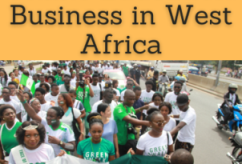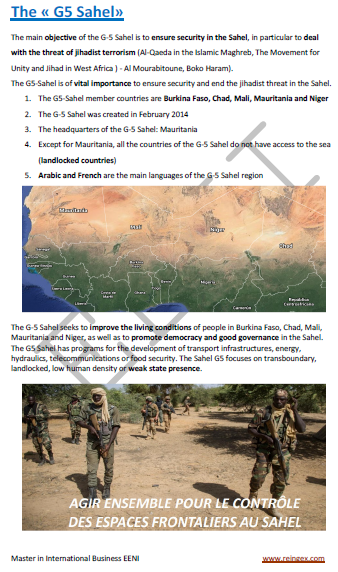G5 Sahel: Fight Against Terrorism

Burkina, Chad, Mali, Mauritania, Niger (G5 Sahel) Fight against Al-Qaeda, Boko Haramr
- Introduction to the G5 Sahel: Burkina Faso, Chad, Mali, Mauritania and Niger (West Africa)
- Threat of the jihadist terrorism in the Sahel (Al-Qaeda in Islamic Maghreb, Movement for the Unity of Jihad in West Africa (MUJAO) - Al Mourabitoune, Boko Haram)
- Objectives of the G5 Sahel: Fight against the jihadist terrorism
- Pilot scheme of the G5 Sahel
- Conference of Heads of State
- Minister Council
- Permanent Secretariat of the G5 Sahel
- Partnerships of the G5 Sahel with France, the EU, Japan, UN

The Subject “G5 Sahel” belongs to the following Online Programs taught by EENI Global Business School:
Courses: Business in West Africa, Central Africa, Maghreb.

Doctorate in African Business, Islamic Business, World Trade.
G5 Sahel:

The main objective of the G-5 Sahel is to ensure the security in the Sahel, in particular to deal with the threat of the jihadist terrorism (Al-Qaeda in the Islamic Maghreb, Movement for Unity and Jihad in West Africa) - Al Mourabitoune, Boko Haram).
The G5-Sahel is of vital importance to ensure the security and finish the jihadist threat in the Sahel.
- The G5-Sahel member countries are Burkina Faso, Chad, Mali, Mauritania and Niger
- The G-5 Sahel was created in February 2014
- The headquarters of the G-5 Sahel: Mauritania
- Except for Mauritania, all the countries of the G-5 Sahel are landlocked countries
- Arabic and French are the main languages of the G-5 Sahel region
The G-5 Sahel seeks to improve the living conditions of the people in Burkina Faso, Chad, Mali, Mauritania and Niger, as well as to promote the democracy and good governance in the Sahel.
The G5 Sahel has programs for Transport & Logistics infrastructures development, energy, hydraulics, telecommunications or food security.
The G5 Sahel focuses on transboundary, landlocked, low human density or weak state presence.
The African regional economic communities related to the countries of the G5 Sahel:
- Burkina Faso, Chad, Mali, Mauritania and Niger belong to the Community of Sahel-Saharan States (CEN-SAD) and Islamic Trade Preferential System (TPS-OIC)
- All the G5 Sahel countries except Mauritania belong to:
- Burkina Faso, Mali and Niger belong to:
- Chad belongs to:
- Mauritania belongs to the Arab Maghreb Union
Logistics related to the G5 Sahel countries:
- Trans-Sahelian Highway
- Dakar-Lagos Corridor
- Cairo-Dakar Corridor
- Algiers-Lagos Corridor
- Lagos-Mombasa Corridor
- Tripoli-Windhoek
- N’Djamena-Djibouti Corridor
- The nearest port of Burkina Faso is the Port of Abidjan
- The nearest port of Chad is the Port of Douala
- The most used port to access to the Malian market is the Port of Dakar and Port of Cotonou to access to Niger
The main religion in the Sahel G5 region is Islam:
- Virtually the entire population of Mali, Mauritania and Niger is Muslim
- In Chad, Islam represents 44% of the Chadian population and Christianity 33%
- In Burkina Faso, 60% of the population is Muslim
- In Chad and Burkina Faso, the influence of the African Traditional Religions is very significant

The Sahel G5 countries belong to three economic spaces of the African Civilization:
- Burkina Faso, Mali, and Niger belong to the West African Economic Area
- Mauritania to the Maghrebian Economic Area
- Chad to the Central African Economic Area

(c) EENI Global Business School (1995-2024)
We do not use cookies
Top of this page





 or
or 

